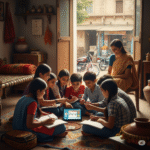New Delhi, India, 2025 — In an era where democracies around the world grapple with political polarization, economic inequalities, and authoritarian threats, India stands as a remarkable testament to the resilience of democratic ideals. With its vibrant electoral system, diverse representation, and deeply entrenched traditions of debate and dissent, India continues to inspire nations across the globe.
However, as it navigates the challenges of the 21st century, India’s democracy must evolve to address pressing issues while maintaining its foundational principles.
The Pillars of India’s Democratic Success
1. World’s Largest Electoral Process
India’s democracy thrives on its ability to mobilize over 950 million eligible voters across diverse socio-economic, linguistic, and cultural backgrounds.
- Fact: The 2024 General Elections recorded an unprecedented voter turnout of 82%, reflecting the trust citizens place in the democratic process (Election Commission of India).
- Impact: This massive participation underscores India’s commitment to ensuring that every voice counts, from the bustling metros to the most remote villages.
2. Institutional Integrity
India’s robust institutions, including the judiciary, Election Commission, and Comptroller and Auditor General, act as checks and balances in governance.
- Example: The Supreme Court’s 2024 landmark ruling on data privacy reinforced the citizen’s right to personal freedom, highlighting the judiciary’s role in upholding democratic values.
3. Diversity as Strength
India’s pluralistic ethos ensures representation for various communities, fostering inclusivity.
- Fact: The 17th Lok Sabha had a record 78 women MPs, the highest in India’s parliamentary history.
- Impact: This inclusivity strengthens India’s democratic fabric, making it a model for multicultural governance.
Challenges on the Horizon
1. Economic Inequalities
Despite impressive GDP growth, economic disparity poses a significant challenge to democratic equity.
- Fact: According to Oxfam India (2023), the wealthiest 1% of Indians own over 40.5% of the nation’s wealth, while the bottom 50% holds only 3%.
- Impact: Economic disparities risk marginalizing underprivileged communities, undermining their political participation.
2. Polarization and Rhetoric
The rise of divisive narratives threatens the unity of India’s democracy.
- Example: The Election Commission of India’s 2024 report highlighted a 20% increase in communal rhetoric during campaigns compared to the previous election cycle.
- Impact: Such polarization distracts from developmental agendas, weakening the essence of democratic discourse.
3. Media and Misinformation
Media, a cornerstone of democracy, faces challenges of misinformation and biased narratives.
- Fact: India ranks 150th in the World Press Freedom Index (2024), reflecting growing concerns over journalistic independence.
Global Comparisons: Why India Stands Out
1. Resilience Amidst Global Democratic Decline
While countries like the United States and Brazil face declining public trust in democratic institutions, India has consistently witnessed high voter turnout and active civic engagement.
- Lesson: India’s grassroots mobilization, facilitated by initiatives like the National Electoral Literacy Campaign, showcases the importance of civic education.
2. Pluralism in Governance
Unlike many nations struggling with ethnic and cultural divides, India’s democracy celebrates diversity.
- Example: Policies like Scheduled Castes and Scheduled Tribes reservations ensure representation for historically marginalized communities.
3. Balancing Growth and Governance
India’s ability to integrate economic reforms with democratic accountability sets it apart from nations where unchecked capitalism undermines governance.
Pathways to Strengthen India’s Democracy
1. Bridging Economic Disparities
- Expand welfare schemes like MGNREGA and Ayushman Bharat to ensure equitable growth.
- Example: Increasing allocations for rural healthcare in the 2025 Union Budget could address access gaps in underserved areas.
2. Safeguarding Press Freedom
- Enact protections for journalists to ensure unbiased reporting.
- Recommendation: Fast-track the Journalist Protection Bill to strengthen media independence.
3. Fostering Inclusive Dialogue
- Encourage interfaith and intercultural platforms to counter divisive rhetoric.
- Example: The Ek Bharat Shreshtha Bharat initiative promotes national integration through cultural exchange programs.
4. Empowering Local Governance
- Strengthen Panchayati Raj institutions to enhance grassroots decision-making.
- Impact: Decentralization fosters accountability and ensures that development aligns with local needs.
Conclusion: India’s Role as a Democratic Beacon
In a world grappling with democratic backsliding, India stands tall as a beacon of hope. Its ability to embrace diversity, empower citizens, and uphold institutional integrity is a testament to its democratic resilience.
However, to maintain its global standing, India must address challenges like economic inequality, misinformation, and polarization. By fostering inclusivity, transparency, and accountability, India can continue to inspire the world as a vibrant and thriving democracy—a true beacon of hope in a complex world.




























